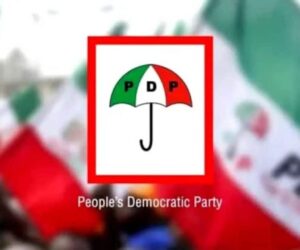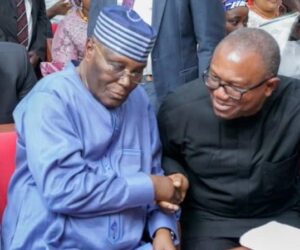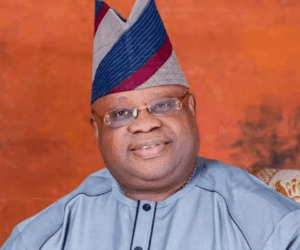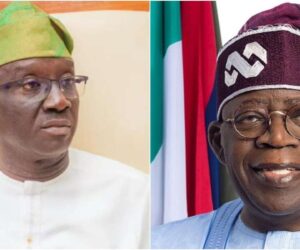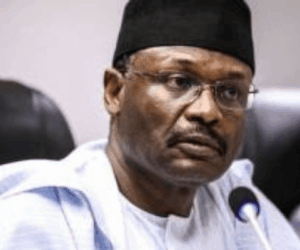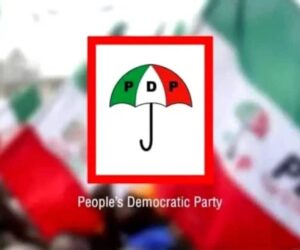1
Barrister Onyinye-Ghandi Chukwunyere, a political activist, is the spokesperson for the African Action Congress (AAC) National Leader and former presidential candidate, Comrade Omoyele Sowore. In this interview with EJIKEME OMENAZU, he speaks on the convergence of the opposition under the African Democratic Congress (ADC), among other crucial issues. Excerpt:
The coming together of the opposition under the African Democratic Congress (ADC) coalition has been on top burner. What do you think about it?
The African Action Congress (AAC) has always acknowledged that political coalitions can be a powerful tool to challenge corrupt and ineffective governments, particularly one as deeply unpopular as the APC. However, the strength of any coalition lies in the moral and ideological integrity of its members. The African Democratic Congress (ADC) coalition, while ambitious, is tainted by the inclusion of individuals who bear responsibility for Nigeria’s current crisis. Figures like David Mark, whose tenure as Senate President from 2007 to 2015 coincided with a terrible period of bad governance and anti-democratic actions by the PDP, cannot credibly claim to offer a new path. These are the same actors who enabled the conditions that birthed the APC’s disastrous rise to power. A coalition built on such shaky foundations is unlikely to deliver the transformative change Nigerians deserve.
The AAC’s stance is not rooted in opposition for its own sake, but in a commitment to principled leadership. We cannot afford to recycle the same tired hands that have plundered our nation’s resources and betrayed its people. The 2015 APC coalition, which promised change but delivered misery, serves as a cautionary tale. Nigerians are wary of false promises and shallow national ambition. The AAC offers a different vision: a coalition not of elites, but of the Nigerian people, united under our banner to demand accountability, equity, and progress. We invite all who share this vision to join us in building a movement that prioritizes the welfare of our citizens over the ambitions of a few.
Would you say the ADC coalition is capable of defeating President Bola Tinubu and the APC in 2027?
In a truly free and credible election, Tinubu and the APC would face a resounding defeat, given their abysmal record. With inflation soaring to 34.2% in June 2025, according to the National Bureau of Statistics, and fuel prices crippling the livelihoods of millions, the Nigerian people are fed up. However, Nigeria’s electoral history, marred by rigging and voter suppression, as documented by independent observers as recently as 2023, shows that credible elections are far from guaranteed. Tinubu’s administration, emboldened by this broken system, governs with arrogance, attacking the basic welfare of Nigerians through policies like subsidy removals that have driven poverty rates to historic highs. Only a united front of ordinary Nigerians can stop the APC from manipulating the 2027 elections. The ADC coalition, while vocal, lacks the ideological clarity and grassroots support needed to challenge the APC’s entrenched rigging machinery. Its reliance on recycled politicians undermines its credibility, as Nigerians crave fresh, principled leadership. The AAC believes that defeating the APC requires more than a coalition of the tired; it demands a movement powered by the people. We are mobilizing Nigerians across every region, from the markets of Kano to the villages of Ogbomosho, to demand transparency and accountability in 2027. By building this mass movement, the AAC aims to ensure that the will of the people prevails, no matter the odds.
Although the ADC coalition is forging ahead, what would you consider its major challenges in its vision of taking over government in 2027?
The primary challenge facing the ADC coalition is its lack of ideological distinction from the APC. Beyond a shared desire to oust the ruling party, the coalition’s proponents, many of whom were complicit in the APC’s rise, offer no clear vision for a better Nigeria. Nasir el-Rufai, for instance, oversaw policies as Kaduna State governor that led to widespread protests over job losses and insecurity, with over 20,000 deaths linked to banditry in the North-West between 2015 and 2022. Nigerians are understandably skeptical of leaders who claim to be saviors while bearing the stains of past failures. This lack of trus, and the coalition’s failure to articulate a radically transformative agenda for the country, severely limits its appeal. Moreover, the coalition faces the hurdle of uniting a fragmented opposition against a corrupt, well-funded, desperate, and entrenched APC. The Nigerian electorate, disillusioned by decades of broken promises, demands authenticity and a commitment to their welfare. The AAC is responding to these popular yearnings by building a movement grounded in clear principles: economic justice, equitable governance, and an end to systemic corruption. Our challenge is to amplify this message and mobilise Nigerians to reject the recycling of failed leaders. We are not just fighting for power, we are fighting for a Nigeria where every citizen has a voice and a stake in the future. That is the coalition Nigerians deserve, and the AAC is committed to making it a reality.
Apart from the APC and the emerging ADC coalition, would you say Nigerians have any other alternative to choose from come 2027?
Absolutely, the AAC stands as the only genuine, people-centred alternative to the APC, the PDP, and their offshoots like the ADC, SDP, and Labour Party. These parties, despite their different names, share the same tired ideologies rooted in self-interest and elite power games. Nigerians have seen through this charade. The AAC offers something different: a mass-based movement that prioritises the needs of ordinary Nigerians over the ambitions of a privileged few. Our vision is built on economic empowerment, social justice, and a radical restructuring of Nigeria’s governance to serve its people, not its politicians. I have seen the struggles of Nigerians firsthand: the market women in Onitsha who can barely afford to restock their stalls, the youth in Lagos who dream of jobs that don’t exist. The AAC is not just another party; it’s a call to action for every Nigerian who believes in a better future. We are mobilising communities, building coalitions in the grassroots, and engaging young people who make up 60% of the country’s population. Unlike the ADC or APC, we are not recycling old promises or old faces. The AAC is the voice of the people, and in 2027, we’ll offer Nigerians a chance to choose hope, integrity, and radical transformation.
A section of the Northern political elite has been accusing President Bola Tinubu of marginalizing the region. How do you see this allegation?
The accusations of marginalisation from some Northern elites are understandable, but they miss the broader picture: Tinubu has marginalised all Nigerians, regardless of region. His policies, from the abrupt removal of fuel subsidies to unchecked inflation, have pushed millions into poverty across the country. According to the World Bank’s 2024 Nigeria Development Update, 40.7% of Nigerians now live below the international poverty line, a burden felt as acutely in Sokoto as in Lagos. While Northern leaders like those in the Arewa Consultative Forum highlight regional grievances consistent with their objectives, the truth is that Tinubu’s misgovernance has no regional bias—it impoverishes everyone equally, from the North to the South. We empathize with the frustrations of Northern communities, who have faced decades of neglect, with 73% of Nigerians in the region now classified as multi-dimensionally poor, according to figures from the National Bureau of Statistics. However, framing Tinubu’s failures as a Northern problem obscures the national scope of the issue and may divide Nigerians when unity is most needed. The AAC believes that the real issue is not regional marginalisation, but a systemic betrayal of the Nigerian people by self-serving elite. Instead of localizing complaints, we must rally together, North, South, East, and West, to demand a government that serves all Nigerians. The AAC is building this national coalition, grounded in shared struggles and a shared vision for a just and prosperous nation.
Would you say President Tinubu has been nepotistic in appointments and projects in favour of the South-West to the detriment of other regions?
To label Tinubu’s appointments as favouring the South-West oversimplifies a more sinister truth: Tinubu governs for himself and his inner circle, not for any region. Like his predecessor, Muhammadu Buhari, Tinubu has adopted a clannish approach, but it’s not about the South-West as a whole; it is about loyalty to Tinubu. A 2024 analysis by Premium Times revealed that over 60% of key appointments in Tinubu’s administration went to individuals with personal or political ties to him. While many of the appointees happen to hail from the South-West, they do not represent the aspirations of ordinary South-Westerners, just as Buhari’s Northern-dominated appointments didn’t uplift the average Northerner, where according to the NBS, poverty rates still remain the highest in the country at 73%. The AAC rejects the narrative that pits regions against each other. The good people of the South-West, like their compatriots in the North or South-East, are struggling under the weight of Tinubu’s policies, including skyrocketing food prices, high unemployment, and a collapsing naira. Tinubu’s ‘boys’ may bear Yoruba names, but they serve only his interests, not those of the South-West or Nigeria at large. The AAC calls for a governance model that prioritizes merit, inclusivity, and the welfare of all Nigerians. We are building a movement to dismantle this cycle of cronyism and ensure that leadership reflects the diversity and dreams of the country.
With the way the current administration is borrowing, do you see any hope for Nigerians?
The APC’s reckless borrowing has pushed Nigeria into a dangerous abyss, threatening not just today’s Nigerians but generations yet unborn. As of June 2025, Nigeria’s external debt stands at $46.4 billion, according to the Debt Management Office, with debt servicing consuming over 50% of federal revenue. This is not just unsustainable, it’s a betrayal. The Tinubu administration’s borrowing spree, coupled with mismanagement and policies like the fuel subsidy removal, has deepened despair, with 133 million Nigerians living in multidimensional poverty, as reported by the NBS. Even without this borrowing, the situation was dire; now, it’s a full-blown crisis, mortgaging our children’s future. But we refuse to believe that Nigeria is hopeless. The AAC sees hope in the resilience of our people: the farmers who toil despite hardship, the youth who innovate against all odds. Our task is to channel this resilience into a movement that demands accountability and ends this cycle of debt and destruction. We call for a complete overhaul of fiscal policy, prioritising investments in education, healthcare, and job creation over loans that enrich a few. The AAC is mobilising Nigerians to take back their country, to build a future where our resources serve the people, not foreign creditors. Together, we can stop this madness and restore hope for a prosperous Nigeria.


